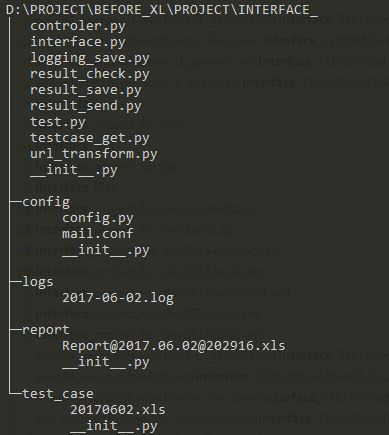基于Python 简易实现接口测试自动化
目录
实现思路
统筹脚本
请求封装
日志封装
结果比对
结果邮件
用例获取及数据格式化
请求url转换
测试用例excel结构
测试报告
邮件接收结果
资料获取方法
实现思路
使用excel管理用例用例信息,requests模块发送http请求,实现了记录日志,邮件发送测试报告的功能
目录结构如下:
下面直接上代码:
统筹脚本
请求封装
# coding:utf-8
import json
import requests
from logging_save import logger
from result_check import Result_check
from url_transform import urltransform
class Interface:
def __init__(self, ):
pass
def interfaceTest(self, case_list):
"""
接口调用主函数
"""
# 用于存结果
res_flags = []
# 用于存请求报文
request_urls = []
# 用于存返回报文
responses = []
# 用户存失败的用例
failed_case = []
# 统计成功失败的用例数
count_success = 0
count_failure = 0
for case in case_list:
try:
# 模块
product = case[0]
# 用例id
case_id = case[1]
# 用例标题
interface_name = case[2].strip('\n')
# 用例描述
case_detail = case[3]
# 请求方式
method = case[4]
# 请求url
url = case[5]
# 入参
param = case[6]
# 预期结果
res_check = case[7]
except Exception as e:
return '测试用例格式不正确!%s' % e
# 定义消息头信息
headers = {'content-type': 'application/json',
'User-Agent': 'Mozilla/5.0 (X11; Ubuntu; Linux x86_64; rv:22.0) Gecko/20100101 Firefox/22.0'}
# 对url进行封装
new_url = urltransform().urltransform(url, method, param)
if method.upper() == 'GET':
results = requests.get(new_url).text
logger.info(u'正在调用接口: %s' % interface_name)
# print results
responses.append(results)
# 用于存储预期结果与实际结果的比较结果
res = Result_check().interface_result_check(results, res_check)
request_urls.append(new_url)
else:
request_urls.append(new_url)
if param == '':
pass
else:
data = json.loads(param) # 将参数转化为json格式
results = requests.post(new_url, data=json.dumps(data), headers=headers).text
responses.append(results)
res = Result_check().interface_result_check(results, res_check)
if 'pass' in res:
res_flags.append('pass')
count_success += 1
else:
logger.warning(u'接口返回结果与预期结果不一致!失败URL: %s METHOD :%s' % (url, method))
res_flags.append('fail')
count_failure += 1
failed_case.append((interface_name, method, url))
logger.info(u'共执行 %s 条用例,PASS: %s,FAILED: %s' % (len(case_list), count_success, count_failure))
return res_flags, request_urls, responses, count_success, count_failure, failed_case日志封装
# coding=utf-8
import logging
import sys
import traceback
import time
class LoggingUtils:
'''
===========封装日志工具类的基本操作=============
'''
def __init__(self,logfile):
'''
:param logfile:
'''
self.logger = logging.getLogger(logfile)
self.hdlr = logging.FileHandler(logfile)
formatter = logging.Formatter('%(asctime)s %(levelname)s - %(message)s')
self.ch = logging.StreamHandler()
self.ch.setLevel(logging.INFO)
self.ch.setFormatter(formatter)
self.hdlr.setFormatter(formatter)
self.logger.addHandler(self.hdlr)
self.logger.addHandler(self.ch)
self.logger.setLevel(logging.DEBUG)
def debug(self, msg):
'''
:param msg:
:return:
'''
self.logger.debug(msg)
self.hdlr.flush()
def info(self, msg):
'''
:param msg:
:return:
'''
self.logger.info(msg)
self.hdlr.flush()
def warning(self,msg):
self.logger.warning(msg)
self.hdlr.flush()
def error(self, msg):
'''
:param msg:
:return:
'''
self.logger.error(msg)
# self.logger.removeHandler(logging.StreamHandler())
self.logger.removeHandler(self.ch)
self.hdlr.flush()
def error_sys(self, limit=None):
'''
:param limit:
:return:
'''
exceptionType, exceptionValue, exceptionTraceback = sys.exc_info()
if limit is None:
if hasattr(sys, 'tracebacklimit'):
limit = sys.tracebacklimit
n = 0
eline = '\n'
while exceptionTraceback is not None and (limit is None or n < limit):
f = exceptionTraceback.tb_frame
lineno = exceptionTraceback.tb_lineno
co = f.f_code
filename = co.co_filename
name = co.co_name
eline += ' File "%s", line %d, in %s \n ' % (filename, lineno, name)
exceptionTraceback = exceptionTraceback.tb_next
n = n + 1
eline += "\n".join(traceback.format_exception_only(exceptionType, exceptionValue))
self.logger.error(eline)
self.hdlr.flush()
timer = time.strftime('%Y-%m-%d',time.localtime())
logger = LoggingUtils('%s.log'%timer)结果比对
#coding:utf-8
class result_check():
def __init__(self):
pass
def result_check(self,results,res_check):
'''
结果对比函数
'''
#返回结果,将结果中的json数据转化为可以和预期结果比较的数据
res = results.replace('":"','=').replace('" : "','=')
#预期结果,是xx=11;xx=22
res_check = res_check.split(';')
for s in res_check:
if s in res:
pass
else:
return '结果不匹配 '+ str(s)
return 'pass'
result_save.py 保存测试结果的模块,复制原有的用例,保存为新的excel
#coding:utf-8
from xlutils import copy
import xlrd
import time
import os
class Save_test_result():
def __init__(self):
pass
def save_result(self,file_path,res_flags,request_urls,responses):
'''
:return:
'''
book = xlrd.open_workbook(file_path)
new_book = copy.copy(book)
sheet = new_book.get_sheet(0)
i = 1
for request_url, response, flag in zip(request_urls, responses, res_flags):
sheet.write(i, 8, u'%s' % request_url)
sheet.write(i, 9, u'%s' % response)
sheet.write(i, 10, u'%s' % flag)
i += 1
report_path = os.path.abspath(os.path.join('report'))
if not os.path.exists(report_path):
os.makedirs(report_path)
new_book.save(os.path.abspath(os.path.join(report_path, 'Report@%s.xls' % time.strftime('%Y.%m.%d@%H%M%S'))))结果邮件
#coding:utf-8
import smtplib
from email.mime.text import MIMEText
from email.header import Header
from email.mime.multipart import MIMEMultipart
import os
from logging_save import logger
class Send_report(object):
def __init__(self,count_success,count_failure,failed_case):
'''
:param count_success:
:param count_failure:
:param failed_case:
'''
self.count_success = count_success
self.count_failure = count_failure
self.failed_case = failed_case
def newest_report(self,testreport='report'):
'''
获取最新的测试报告
:param testreport:
:return:
'''
lists = os.listdir(testreport)
lists.sort(key=lambda fn: os.path.getmtime(os.path.join(testreport,fn)))
file_new = os.path.join(testreport, lists[-1])
logger.info('获取最新附件报告成功')
return file_new
def send_result(self,username,passwd,from_addr,to_addrs,smtpserver,*args):
'''
:param username:
:param passwd:
:param from_addr:
:param to_addrs:
:param smtpserver:
:param args:
:return:
'''
sender = from_addr
subject = '财富港接口测试结果'
username = username
passwd = passwd
'''邮件内容'''
tille = (u'用例名称', u'请求方式', u'url')
details = (u'成功: ' + str(self.count_success) + u'失败: ' + str(self.count_failure)) + '\n' + u'失败的用例如下 :' + \
'\n' + '\n'.join(str(zip(tille, i)) for i in self.failed_case).decode('unicode-escape')
logger.info('邮件附件为: %s' %(args[0].split('\\')[1]))
if args != None: #判断是否添加附件
msg = MIMEMultipart()
msg.attach(MIMEText(details, 'plain', 'utf-8'))
i = 0
while i < len(args): #可以添加多个附件
part = MIMEText(open(args[i], 'rb').read(), 'base64', 'utf-8')
part["Content-Type"] = 'application/octet-stream'
part["Content-Disposition"] = 'attachment; filename="%s"'%args[i]
msg.attach(part) #添加附件
i += 1
msg['subject'] = Header(subject, 'utf-8')
msg['From'] = from_addr
msg['To'] = ','.join(eval(to_addrs)) #兼容多个收件人
smtp = smtplib.SMTP()
try:
smtp.connect(smtpserver)
smtp.login(username, passwd)
smtp.sendmail(sender, eval(to_addrs), msg.as_string())
smtp.close()
logger.info('带附件测试报告发送成功!')
except smtplib.SMTPAuthenticationError,e:
logger.error('邮箱账户或密码错误: '+ str(e))
else:
msg = MIMEText(details, 'plain', 'utf-8')
msg['subject'] = Header(subject, 'utf-8')
msg['From'] = from_addr
msg['To'] = ','.join(eval(to_addrs))
smtp = smtplib.SMTP()
try:
smtp.connect(smtpserver)
smtp.login(username, passwd)
smtp.sendmail(sender, eval(to_addrs), msg.as_string())
logger.info('测试报告发送成功!')
smtp.close()
except smtplib.SMTPAuthenticationError,e:
logger.error('邮箱账户或密码错误 : '+str(e))用例获取及数据格式化
#coding:utf-8
import xlrd
from logging_save import logger
class Get_testcase(object):
def __init__(self, file_path):
'''
:param file_path: 用例文件路径
'''
self.file_path = file_path
def readExcel(self):
'''
读取用例函数
:return: 测试用例列表
'''
try:
book = xlrd.open_workbook(self.file_path) # 打开excel
except Exception, error:
logger.error('路径不在或者excel不正确 : ' + str(error))
return error
else:
sheet = book.sheet_by_index(0) # 取第一个sheet页
rows = sheet.nrows # 取这个sheet页的所有行数
case_list = [] # 用于保存用例信息
for i in range(rows):
if i != 0:
case_list.append(sheet.row_values(i)) # 把每一条测试用例添加到case_list中
return case_list请求url转换
#coding:utf-8
class urltransform(object):
def __init__(self):
pass
def urltransform(self, url, method, param):
'''
:return:
'''
if param == '':
new_url = url
else:
if method.upper() == 'GET':
new_url = url + '?' + param.replace(';', '&') #如果有参数,且为GET方法则组装url
else:
new_url = url
return new_url测试用例excel结构
![]()
config目录下,config.py 获取配置文件信息的模块
#conding:utf-8
import ConfigParser
class Config(object):
def __init__(self,file_path):
self.config = ConfigParser.ConfigParser()
self.config.read(file_path)
def get_mail_config(self):
login_user = self.config.get('SMTP', 'login_user')
login_pwd = self.config.get('SMTP', 'login_pwd')
from_addr = self.config.get('SMTP', 'from_addr')
to_addrs = self.config.get('SMTP', 'to_addrs')
smtp_server = self.config.get('SMTP', 'smtp_server')
port = self.config.get('SMTP', 'port')
return login_user, login_pwd , from_addr, to_addrs,smtp_server, port
def report_save_config(self):
passmail.conf
[SMTP]
login_user = 18******@163.com
login_pwd = ******
from_addr = BI<18******@163.com>
to_addrs = ['18******@163.com']
#to_addrs = ['1******@qq.com','******.com']
smtp_server = smtp.163.com
port = 25测试报告
邮件接收结果
资料获取方法
【留言777】
![]()
![]()
各位想获取源码等教程资料的朋友请点赞 + 评论 + 收藏,三连!
三连之后我会在评论区挨个私信发给你们~


